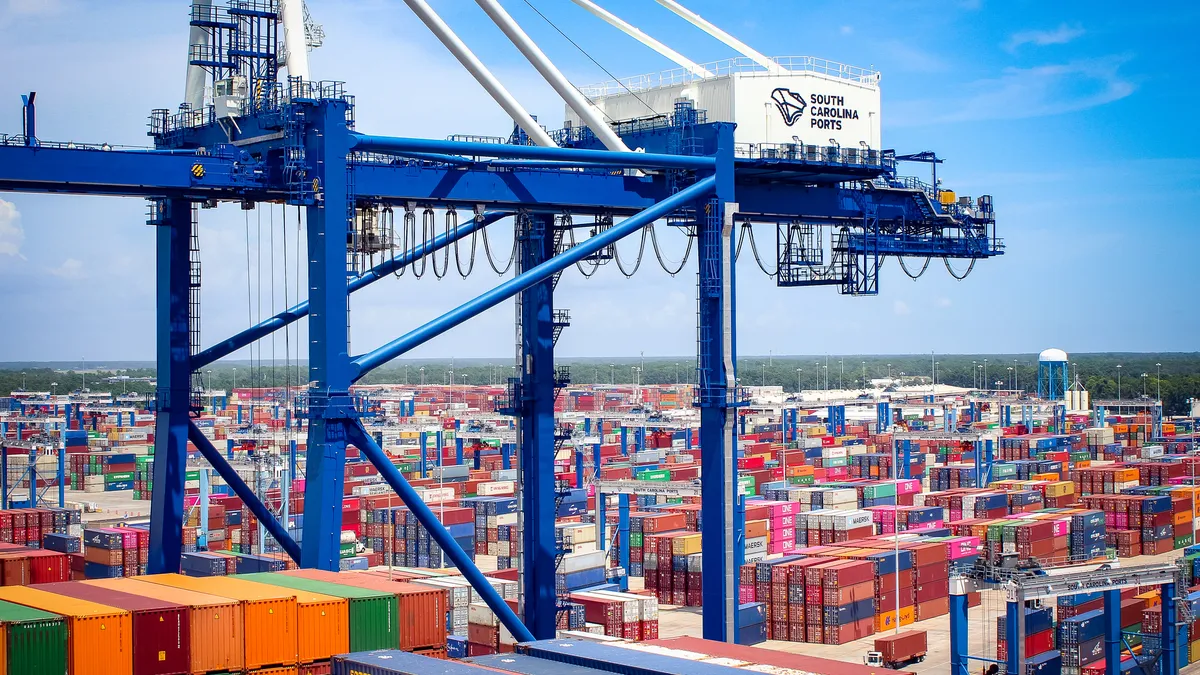Dive Brief:
- The Biden administration Thursday redoubled U.S. economic sanctions against Russia, underscoring how rising tensions over the invasion of Ukraine have slowed the recovery of global supply chains and darkened the outlook for inflation.
- "Supply disruptions from Russia and Ukraine of metals and other minerals throw a wrench in the supply chain recovery," Moody's Investors Service said in a report, highlighting disruptions to exports of industrial metals including copper, nickel, palladium and gold as well as grains and other agricultural products.
- Noting that oil prices have surged since the invasion began, Moody's said, "the rise in fuel and metals prices will continue to exacerbate supply-side cost pressures. Renewed production delays and freight issues will limit output capacity." Moody's reduced its estimate for U.S. growth this year 0.3 percentage point to 4.2%.
Dive Insight:
Since the start of the pandemic, companies have faced an array of challenges from clogged supply chains, including rising cost of inputs, disruptions to production, pressure to raise prices and the need to update risk assessments.
The Russian invasion "poses fresh risks to global supply chains, mainly because of soaring energy prices and suspended trade routes, but also because of related risks: input material and component shortages, higher priced transportation and key commodities and disrupted cargo flows," Moody's said.
"The myriad risks to supply chain normalization come just as they were beginning to recover from COVID-19," Moody's said, flagging a setback for auto and semiconductor manufacturers.
Since the beginning of the invasion on Feb. 24, the U.S. and European countries have sought to punish the Kremlin through economic sanctions, export controls and other measures. They have shut down the Nord Stream 2 pipeline and targeted Russia's biggest companies and financial sector.
The U.S. Treasury Thursday announced sanctions denying 48 Russian defense companies access to western technology and financing. "Today's action will have a deep and long-lasting effect on Russia's defense industrial base and its supply chain."
The Treasury also imposed restrictions on 328 members of the Russian State Duma and the head of Sberbank, which it said is Russia's largest financial institution.
The package of sanctions "aligns with similar actions by the European Union, the United Kingdom and Canada, and reflects continued unity to hold Putin accountable for his war of choice," the Treasury said.
Supply chain disruptions will probably ease in the coming months, helping correct a supply-demand imbalance and slow inflation, Federal Reserve Chair Jerome Powell said at a March 16 press conference after a meeting of policymakers.
Fed officials forecast that their preferred inflation measure — the core personal consumption expenditures (PCE) price index — will decline to 4.1% by December from a 38-year high of 5.2% in January.
The Fed, citing price pressures, raised the federal funds rate on March 16 for the first time since 2018. It has set an inflation target of 2%.
For several months until November 2021, Powell and other Fed officials predicted that crimps in supply chains would ease, helping to rein in a "transitory" acceleration in price gains. During the March 16 press conference, Powell acknowledged that the forecast was erroneous.
"If we knew now that these supply blockages, really, and the inflation resulting from them in collision with, you know, very strong demand – if we knew that that was what was going to happen, then in hindsight, yes, it would have been appropriate to move earlier" in raising the benchmark interest rate, Powell said.















